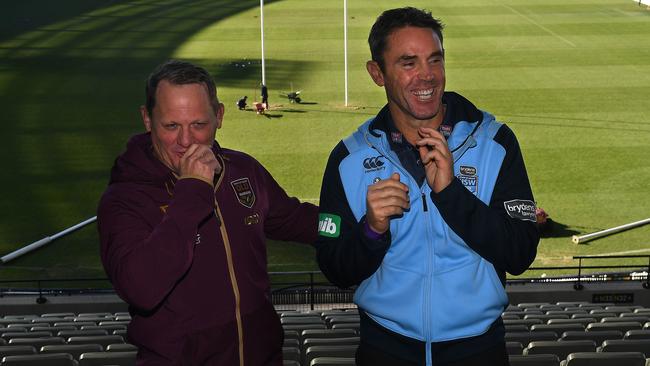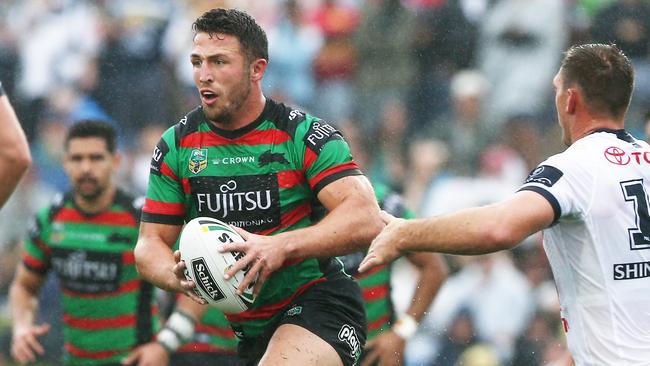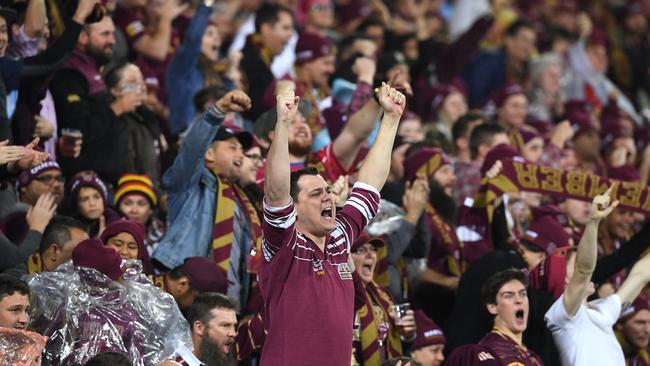Why State of Origin desperately needs to bring back the hatred
RATINGS for State of Origin are at their lowest point in over a decade. PAUL KENT reveals why fans aren’t as enchanted by interstate football as they used to be.

Blues
Don't miss out on the headlines from Blues. Followed categories will be added to My News.
BRAD Fittler’s pre-Origin sledge of Cameron Smith, though nicely placed, came a month too late.
They were the first inflammatory words spoken all series and they came when the series was over.
By then, most of Queensland had turned Origin off, already down 2-0 in the series. Queenslanders don’t do losing.
NSW fans were also gone, off to discuss real estate prices over a double shot latte.
Aside from the result they had nothing to talk about.
No fuse got lit during this Origin series.
LISTEN: Nick Campton and Tim Williams break down Origin one more time, look ahead to the race to the finals and argue over Campo’s player ratings.
Subscribe to the League Central podcast on iTunes
Queensland Kevin Walters comes to the job schooled on the Maroons doctrine of nicely nicely. For years Queensland, once Mal Meninga took over, said nothing publicly while privately seething.
Meninga called them “triggers”.
Fittler lightly baited Queensland the day before Wednesday’s third game.
Tired of the assumption that NSW won the series only because Smith retired three weeks before it began, after Johnathan Thurston and Cooper Cronk said adios last year, he bit.
“For whatever reason he [Smith] might have thought we were picking 11 players that were harder than what he wanted to take on this year,” Fittler said.
As sledges go, it was hardly Paul Gallen calling the Maroons “two-heads”, as he did in 2014. Or Benny Elias declaring the Queensland floods “a mimic” compared to what the Blues were about to do to them in 2011.

But Fittler made the point. Queensland couldn’t lament the loss of Smith and Co any more than would have welcomed back Andrew Johns, Danny Buderus or Fittler himself during the dozen years of Queensland domination.
For starters, Smith had no idea Fittler was picking 11 debutantes. But how long can Queensland continually complain about the loss of Smith and Co? Who else do they bring back, Alf?
Television drew the lowest metropolitan audience since 2006. This, after Game II drew the lowest audience since the Game III dead rubber in 2010. Every stat you look at reveals a slide.
Combined with mild build-ups before the games, they contributed to a legitimate concern for the future of rugby league’s great showpiece.
It led a big week in rugby league.
The day after Origin the Australian Rugby League Commission met in Brisbane and rolled their sleeves to take on the Rugby League International Federation (RLIF) later this month in Singapore.
The RLIF has had the audacity to ask the NRL for $4 million to cover their losses this past year. Right before they plan to reduce Australia’s voting rights and influence on the international board.
NRL chief executive Todd Greenberg heads to the meeting with the intention of ousting the ARLC’s other delegate on the board, former Commissioner John Grant, who is trying to circumvent the loss in confidence of his own nation by implementing a change in constitution so he can remain as an independent.
Yep. Astounding.
The bullish stance has put international football back on the agenda. The RLIF might not like what it hears in Singapore.
It will continue to stalemate until the silent voice so far in all of this, the players association, wade in and tells both the NRL and RLIF what it wants.
But there is much to fix.
The threatening brawl between the NRL an RLIF, the mid-season Test played in Denver between New Zealand and England last month, this year’s softening interest in Origin, and the increasing power of the Pacific nations means the NRL must rethink its position on representative football.

Earlier this week my colleague Phil Rothfield failed his concussion test but not before writing that it might be time for Origin to consider a wildcard selection to revive interest, each State allowed to choose the likes of England’s Sam Burgess or Tonga’s Jason Taumalolo.
It was a concession to the fact that, at some point, many of the best players in the NRL will not be eligible under current rules to play for NSW or Queensland.
The percentage of Polynesian players in the NRL grows exponentially. Many are pledging allegiance to their heritage ahead of Australia.
But this idea of the best of the very best, is that why Origin has worked?
That it emerged during the decline of international football added to that narrative.
Only Origin hasn’t always had all of the best talent.
Ellery Hanley played for Balmain and Western Suburbs in the late 1980s and early 1990s and could easily have represented NSW if he was not already committed to Great Britain.
On talent alone, he qualified. But Origin didn’t miss Hanley.
It didn’t miss Mark Graham or Stacey Jones. It didn’t miss Sonny Bill Williams and hasn’t missed Burgess or James Graham even though, based on talent, they are surely among those very best.

When the Super League players were banned in 1995 and the bulk of Queensland and a good part of NSW were unavailable, the likes of Allan Langer, Steve Renouf, Mick Hancock, Glenn Lazarus, Laurie Daley, Ricky Stuart, Brad Clyde all out, such was the venom
Nobody knows why Origin works. All we know is way back in 1980 Arthur Beetson sprinkled a little magic dust on that first game and ever since Queensland has always carried a little some of it with them.
Sport is always about the battle of hearts and minds.
Origin always captured the heart before the mind.
Origin’s success is the passion of those who wear the Queensland and NSW jerseys, and of those who support them.
Nothing is rational, none of it makes sense. Queenslanders rage at Gallen’s insult, as absurd as it was. To be insulted would be to accept there was some truth.
Nobody was better at needling Queensland than Phil Gould. He made it seem like an accident.
The game grew on villains and retribution. It began with Wally Lewis, then Benny Elias, Gould, Ricky Stuart …
LATE MAIL: All the latest team changes
BOOST: Broncos poised to keep rookie
Insults real and imagined were dealt with on the field … until the NRL banned punching.
It led water cooler conversation before and after the game.
The villains built the theatre, and all because it meant so much to them. They created a conversation for non-traditional rugby league fans, the ones that made the audience so big, the fans missing from this year’s television audience.
In comparison to other years the narrative around this year’s series has been boring.
The beat writers have worn down their fingers phoning mums and dads and junior coaches in a bid to satisfy the appetite for Origin even though not one legitimate news story broke the entire series.
Not one insult, until Fittler’s small jab at the end.
When wondering where the fans went it might be worth wondering if Origin has finally committed the greatest sin of all.
It got tamed.
DALEY FIRES BACK AT CRITICISM
LAURIE Daley dared rugby league fans to question his integrity while defending his role in naming Billy Slater as the Wally Lewis Man of the Series
“One thing I do know, and Mal Meninga knows, and Darren Lockyer knows _ don’t ever question my integrity, don’t ever question (why) I’m voting because of whatever reason,” Daley said on his morning radio show.
While everybody was questioning their choice, nobody was questioning their integrity.
Nope, it took the NRL’s refusal to reveal how the votes were polled to do that.
Meninga said all the judges acted independently and Slater was who they arrived on based on their 4-3-2-1 voting system.
Lockyer was matter-of-fact, saying this was the system and that’s how it turned out.
Nobody’s integrity was questioned.
And if the judges were so comfortable with how they polled performance then why the reluctance to reveal how the votes went down?
It is another massive fumble for the NRL, who speak of transparency publicly yet hide behind protocol, then throw up words like “integrity”, as chief executive Todd Greenberg did, to throw off legitimate queries.
Given the NRL allows gambling to take place on the award transparency, and the option for critical analysis, should be paramount.
Only then, if everybody was satisfied they remained true to the system which gave Slater as the winner, only one possible situation is left: the system is broke and we should fix it.
CLARIFICATION
LAST week this column reported the Parramatta Eels have paid $1.5 million in fees to State government appointed administrator Max Donnelly and his employer Ferrier Hodgson. The fees paid to Donnelly and Ferrier Hodgson is around $700,000. It was also reported the club
has a debt of $25 million instead of stating that Eels have taken out a $25 million loan for their carpark redevelopment.
